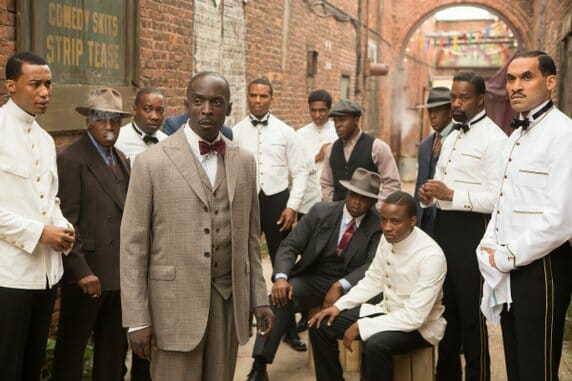Boardwalk Empire: “White Horse Pike” (Episode 4.10)
Photo by Craig Blankenhorn, courtesy of HBO
When Boardwalk Empire introduced heroin to its universe, it took a legal problem and turned it into something oddly more. The drug has slowly been circulating on the show for years, but it’s only now, at the end of the fourth season, finally becoming the center of the show’s story. It’s a matter of looking at the period from a century later that makes this parallel so obvious yet so problematic, a direct analogy to alcohol that isn’t so direct at all. It’s easy, after the end of prohibition and liquor consumption seemingly more rampant than ever (at least, if the rate of new microbreweries popping up in my hometown is to serve as any barometer) to say that liquor laws were ridiculous and caused incredible amounts of violence and social problems. But then, what’s really different about it as a controlled substance than, say, heroin? Where’s to draw the line when they’re both illegal—for instance, if you’re smuggling liquor in from Tampa, why would you think twice about smuggling some heroin alongside it?
But of course, heroin isn’t just like alcohol, and morality has a lot more shades of gray to it than simply saying that liquor smuggling is fine but heroin smuggling is wrong. My frustration with Dr. Narcisse, for instance, comes from the fact that he doesn’t seem to find anything different between earning money through heroin or violence than he does through any other means. He truly does seem to believe in activism for African-American rights, but his own pockets always seem to come first. He’s not Marcus Garvey; ultimately he’s a gangster, and he prefers earning money with the Italians to focusing on his advocacy. That being said, it doesn’t necessarily delegitimize the work he does for his own community. Some characters on Boardwalk Empire are able to have this sort of cognitive dissonance while others aren’t, and in a way there’s always been a struggle in the show between characters who understand what they’re doing and do so anyway and those, like Narcisse, who seem to have convinced themselves that the ends justify the means.
-

-

-

-

-

-

-

-

-

-

-

-

-

-

-

-

-

-

-

-

-

-

-

-

-

-

-

-

-

-

-

-

-

-

-

-

-

-

-

-








































